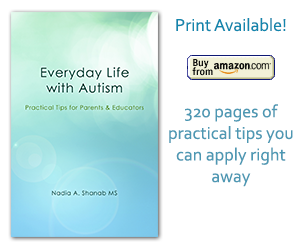By Nadia Shanab | autism, general advice, parenting
These simple tools can be used at school and at home. They are easy to acquire and they don’t take too much room. 1- The “Write-on Wipe-off” board I simply called it the “white board”. I bought it at Lakeshore (it is learning store) www.LakeshoreLearning.com for $4.95, it is a two sided board, one is lined
Tags: autism, communication, parenting, problems, rules, schedule, senses, sensory, tips, visual aids
Posted in autism, general advice, parenting | 3 Comments »
By Nadia Shanab | autism, general advice, parenting
This is a list of things you can do or use to help children with sensory disorders. I will talk in more details about each one in future articles: “Write-on wipe-off” board Weighted vest Trampoline Massager Compressions and hands massage Bubbly cushion Bouncing ball Bean bag Bean tub Ball chair Play dough Balance beam Physical
Tags: autism, occupational therapy, parenting, problems, senses, sensory, techniques, visual aids, visual timer
Posted in autism, general advice, parenting | 3 Comments »
By Nadia Shanab | autism, general advice, parenting, tips
What appears to us as a misbehavior, is in fact a reaction of autistic children to their overwhelming environment. Often times they are oversensitive (hypersensitive). On the other hand, they can be indifferent to the input to their senses or under sensitive (hypo sensitive). If they get overstimulated they try to do anything to self-regulate
Tags: autism, communication, parenting, problems, senses, sensory, tips, visual aids
Posted in autism, general advice, parenting, tips | 4 Comments »
By Nadia Shanab | autism, parenting, tips
One of the world’s most famous contemporary artists is an autistic man named Stephen Wiltshire. He was mute in his early childhood and used to throw severe temper tantrums. He lived in his own world and never related to other human beings. At the age of three he was diagnosed with autism and he had
Tags: art, autism, communication, parenting, visual aids
Posted in autism, parenting, tips | 5 Comments »
By Nadia Shanab | autism, parenting, tips
When you tell a child — especially with special needs — “don’t“, you leave her/him with no options. When you give an alternative or a substitute, you are giving her/him an opportunity to correct or modify the inappropriate behavior or action. What should you do? Use the affirmative form instead of the negative form when you
Tags: autism, parenting, techniques, tips, visual aids
Posted in autism, parenting, tips | 40 Comments »
By Nadia Shanab | autism, parenting, tips
Autistic children rely intensively on their visual skills. I always make sure to use a visual timer along with the daily schedule. The visual timer has the advantage of giving a real feeling of time. It helps estimate the elapsed time and anticipate the remaining time. It compares to the difference between a digital watch
Tags: autism, discipline, organization, schedule, tips, visual aids, visual timer
Posted in autism, parenting, tips | 5 Comments »
By Nadia Shanab | autism, general advice, parenting
It is one of very few true success stories told by a woman who lives with Asperger’s syndrome. She became an animal scientist and a professor at the university. The protagonist, Temple Grandin, was able to explain and describe very skillfully how a person with this condition feels, hears, sees, perceives and thinks. She helps people
Tags: asperger's syndrome, autism, books, communication, parenting, reading, recommended, visual aids
Posted in autism, general advice, parenting | 40 Comments »
By Nadia Shanab | autism, general advice, parenting, tips
There is a way to go into the mind of kids with poor verbal skills and check their understanding of language. This activity engages several senses along with the thinking process. The kids usually like it because it appears to them as a game. I like doing this activity especially in the afternoon when the
Tags: autism, communication, comprehension, discipline, handwriting, organization, reading, schedule, tips, visual aids
Posted in autism, general advice, parenting, tips | 1 Comment »
By Nadia Shanab | autism, general advice, parenting
Consistency plays a key role in any success. Applying rules consistently takes determination and effort, but it pays off in the long term. It helps the child form and build her own learning schemes in a structured way. Consistency doesn’t leave room for confusion. It is an excellent way to model conformity and discipline. If a
Tags: autism, communication, discipline, organization, parenting, rules, schedule, visual aids
Posted in autism, general advice, parenting | 11 Comments »
By Nadia Shanab | autism, general advice, parenting
People tend to perceive noncompliance as stubbornness or misbehavior. Autistic kids do not always perceive our directions the way neurotypical kids do. Why? Because of their sensory integration issues or their condition in general. They see, hear, smell, feel and process (think) differently. When the child doesn’t comply or conform, she/he is trying to communicate
Tags: autism, communication, discipline, organization, techniques, visual aids
Posted in autism, general advice, parenting | 6 Comments »







